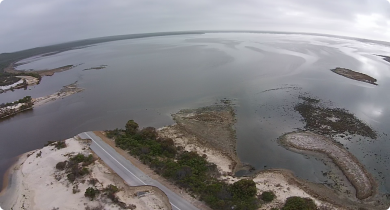Climate & weather
Enabling farm businesses to better manage the increasing seasonal variability is critical for the success of the Western Australian agrifood sector. The Department of Primary Industries and Regional Development is enabling farm businesses to make more informed planning and financial decisions on weather and climate risks. These decisions range from short-term tactical decisions, through to managing strategic planning for climatic futures. The development of improved weather data and seasonal forecasting tools are designed to assist you to better manage and take full advantage of the opportunities related to seasonal variability and climate change.
The Department of Fire and Emergency Services has launched a new website; emergency.wa.gov.au. This website will replace the existing alerts and warnings websites from DFES and Parks and Wildlife, enabling people to get critical public information during fire, flood, storm, earthquake, tsunami and emergencies involving hazardous materials.
Filter by search
Filter by topic
- (-) Remove Frost filter Frost
- Crops (20) Apply Crops filter
- Grains (19) Apply Grains filter
- Wheat (5) Apply Wheat filter
- Grains research & development (5) Apply Grains research & development filter
- Canola (4) Apply Canola filter
- Production & postharvest (3) Apply Production & postharvest filter
- Soils (2) Apply Soils filter
- Pulses (2) Apply Pulses filter
- Managing soils (2) Apply Managing soils filter
- Grains Research & Development (2) Apply Grains Research & Development filter
- Lupins (2) Apply Lupins filter
- Horticulture (1) Apply Horticulture filter
- Oats (1) Apply Oats filter
- Hay production (1) Apply Hay production filter
- Pastures (1) Apply Pastures filter
- Sowing (1) Apply Sowing filter
- Water repellence (1) Apply Water repellence filter
- Harvesting (1) Apply Harvesting filter
- Soil compaction (1) Apply Soil compaction filter
- Barley (1) Apply Barley filter
- Climate change (1) Apply Climate change filter
- Avocados (1) Apply Avocados filter
- Dry seasons and drought (1) Apply Dry seasons and drought filter
- Field peas (1) Apply Field peas filter
- Floods, storms and cyclones (1) Apply Floods, storms and cyclones filter
- Fire (1) Apply Fire filter
- Fruit (1) Apply Fruit filter









